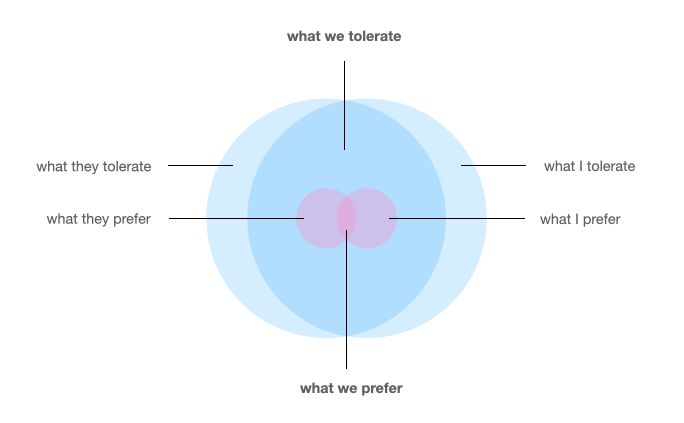In the absence of hierarchy, how we make decisions is as important as the decision we make. As an open, functional cooperative we operate on a one member, one vote policy. However, most of the time we trust one another to be getting on with things.
We have three levels of decision making:
¶ It’s cool we trust each other
We Are Open Co-operative runs on distributed leadership. We encourage our members to act on behalf of the co-op when making:
- Judgement calls in getting back to clients. Sometimes it's not possible to herd all the cats before a client or potential client is expecting an answer. We trust our members to communicate on behalf of the cooperative and fill in the rest of us later.
- Judgement calls on infrastructure decisions (e.g. I need to renew this URL or I used this tool for a client and now need to pay for it). We meet weekly, so this doesn't happen very often, but every once in a while, we get a notice that we need to renew or cancel something right now. Members try to make the cooperative aware of these kinds of things in our chat channels, but even without full consensus (because one of us was missing the Day the Data server died), we trust that everyone is trying to make good decisions for the collective
¶ One other member
None of us are perfect, and sometimes it makes sense to gut-check things with at least one other member:
- Client proposals. When we submit proposals for work, we ask another member to have a quick look. We always catch each others typos. It also helps to have someone double check our maths, though how a project is priced is based on client context, not on useless formulas.
- Publishing in the name of the co-op. Again, double checking each others blog posts is more about helping each other eliminate typos than trying to have a unified, marketing voice. We are a collection of voices, everyone is encouraged to use their authentic voice.
- Project-based decisions. We will likely come up with more ways to think about project based decisions, but our general rule of thumb is that each project has a leader, and that leader takes responsibility for that project. The only place we ask for consultation is when agreeing a lower day rate (but not below our lowest day rate). Whomever is involved in the project should have a vote on that one.
¶ Consent-based decision making
We use consent-based decision making for issues that we feel require everyone's involvement and a defined process. We use Sociocracy for this:
Sociocracy, also called dynamic governance, is a system of governance which seeks to create psychologically safe environments and productive organizations. It is distinguished by the use of consent, rather than majority voting, in discussion and decision-making by people who have a shared objective or work process.
Some examples of the kinds of things we might decide using this process:
- Contract day rates
- Legal contracts
- NDAs
- How we spend money generally
- Spending money on co-op projects
- Co-ops work tools
- Adding a new member
This image by Stowe Boyd, based on the work of Richard D. Bartlett, helps explain how consent-based decision making works:

There's plenty of nuance to it, and it's the kind of thing that requires practice, but in general:
- Someone makes a proposal.
- Someone else introduces the proposal to the group.
- Everyone is asked individually if they have an 'clarifying questions' (which the proposal-maker answers).
- Everyone is asked to show thumbs-up, thumbs-neutral (sideways), or thumbs-down as an initial reaction.
- If it's all thumbs-up, the proposal passes. Otherwise, we move onto...
- Everyone is asked individually for 'critical concerns'. Per the diagram above, this focuses on what people will tolerate rather than what they prefer.
Doug has written about the process on his blog:
We also discussed this in Episode 5 of our podcast, The Tao of WAO with John Evans from Code-Operative, a sister organisation in the CoTech network.